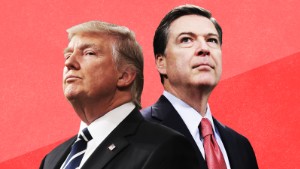If there are tapes, can the White House be forced to turn them over?
For President Richard Nixon, the controversy over his secret White House tape recordings began with a break-in at the Watergate Hotel. If President Donald Trump is also keeping recordings of his conversations, any controversy over those will have begun with a tweet.
On May 12, three days after firing FBI Director James Comey, Trump tweeted: "James Comey better hope that there are no 'tapes' of our conversations before he starts leaking to the press!"
Since then, the possible existence of audio recordings of Oval Office conversations have been a topic of conversation among many on Capitol Hill. The House intelligence committee has called on both the White House and Comey to hand over any material related to its Russia investigation, including memos and recordings, by June 23.
But two questions remain: Are there actually audio recordings? And, if so, do Trump and the White House have to hand them over?
"The short version is, if there are tapes, and if they are subpoenaed, I think the White House will probably have to turn them over," said Stephen Vladeck, a professor at the University of Texas School of Law and a CNN legal analyst.
More than four decades ago, the Senate voted to create a special investigative committee to look into the Watergate break-in, and Archibald Cox, the Watergate special prosecutor, subpoenaed the White House tapes from Nixon.
Nixon citing executive privilege, refused to turn them over and sought to fire Cox. After his top two Justice Department officials resigned rather than carry out Nixon's order to oust the special prosecutor, Solicitor General Robert Bork, who became acting attorney general, did fire Cox in October 1973 in what is referred to as the "Saturday Night Massacre." In July 1974, the Supreme Court unanimously ruled that Nixon had to turn over tape recordings of his conversations, and the next month, facing almost certain impeachment, Nixon resigned.
Much has changed since then, but legal experts say the precedent set by the Nixon era remains the same.
"The Nixon example itself teaches us that executive privilege can be overcome, especially when the relevant information is potentially material for an ongoing criminal investigation," Vladeck said.
According to Ronald Rotunda, who was an investigator during Watergate, turning over tapes is as much about politics as it is about the law.
"If there are tapes, it is probably not very difficult for the Justice Department to get them," Rotunda, a Chapman University law professor, told CNN. "But whether the Senate or House can get tapes is really more politics than law. There have been disputes over the years -- many, many years -- between the president and the Congress on turning over material long before there were tapes."
Should the White House fight a subpoena, Trump's tweets could end up hurting him.
"By talking about the content of those conversations publicly by tweeting, the President has already disclosed in substance what happened," Lisa Kern Griffin, a professor at Duke University School of Law, told CNN. "And in doing that, he may have waived important aspects of executive privilege."
Jay Sekulow, a member of President Trump's private legal team, said Sunday on ABC News' "This Week" that Trump will address the existence of any recordings in the coming week.
News Courtesy: www.cnn.com











